Beating the Drum to See Poverty: Experiencing Music as Labor among Roma in Vranje, Serbia
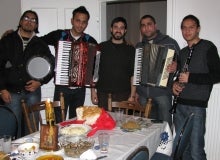
When I first began to conceptualize my dissertation project, I was most interested in the ways that musical performance shapes ethnic relationships and identity politics for Romani musicians in Vranje, Serbia. As such, I eagerly anticipated conversations in the field about performer strategies, musician-patron interactions, and musician roles in celebratory rituals. As the days and months passed, however, I found that people inevitably wanted to talk more about the current economic crisis in Vranje. Instead of talking about performances and rituals, locals insisted on lamenting the loss of musical incomes and prestige, and nostalgically reminisced about the greater demand for—and returns from—musical performances under Yugoslav Socialism.
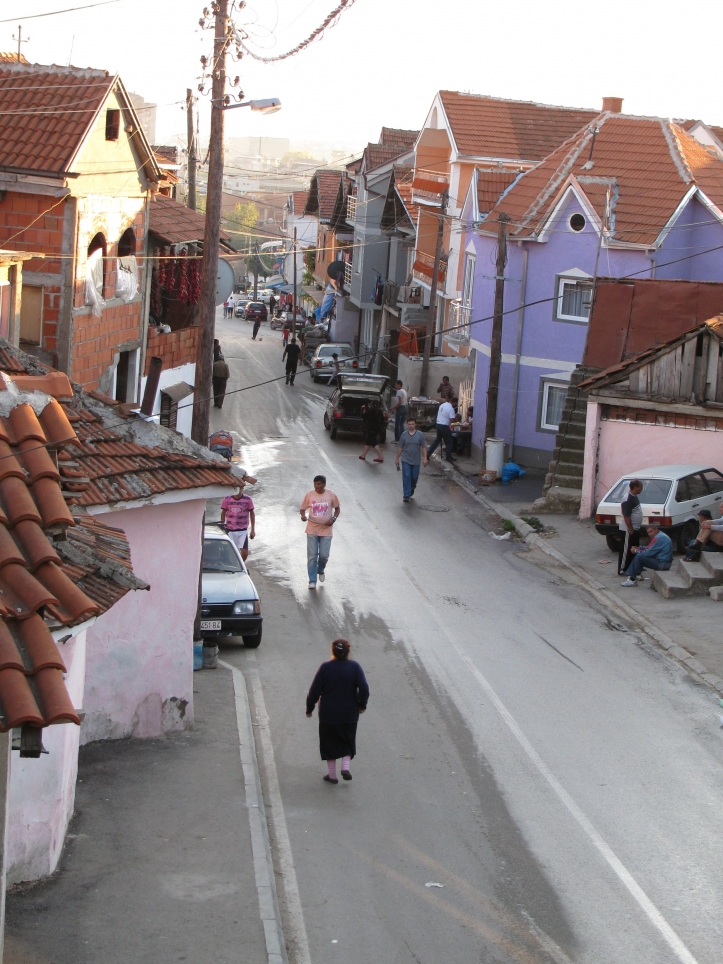
Evening activity along the main road in the Romani mahala Gornja Čaršija (the "upper marketplace") in Vranje.
Many months and conversations into my work, I witnessed firsthand how difficult it has become for local Romani musicians to maintain their professional niche. On a gloomy day in February 2010, I shouldered a double-headed goč drum and accompanied a small group of Romani musicians heading out to perform in two villages near Vranje on the occasion of a patron saint feast-day, or slava. These young men (two accordion players, one clarinetist, and one tarabuka drummer) keep close tabs on the Orthodox Christian religious calendar, building clientele and drawing much of their musical income by performing at people’s homes and entertaining guests during such family celebrations. Saint’s day celebrations have long been a performance “staple” for Vranje’s Romani musicians, and older entertainers often encourage young musicians to obtain experience and build repertoires by performing for Serb patrons at these events. The unofficial leader of this particular group, however, was concerned from the outset that I would be overwhelmed by the real difficulties musicians faced in the current state of crisis. “You’ll become disappointed in life itself,” he told me, after seeing how little money we might earn. I assured him that I still wanted to accompany them, reiterating that my research would be tremendously enriched by experiencing first-hand the working conditions (and strategies) of Romani musicians.
On this particular day, our group spent hours walking through the major part of these two villages, looking for homes where celebrations appeared to be ongoing. Time and time again likely prospects for a performance were shattered as we filed into courtyards and called out greetings, our instruments at the ready in our hands, only to be turned away. Many hosts explained that too many bands had already come through, and as such the families no longer had the money or patience for additional entertainers. Indeed, at every turn we ran into other orchestras, some even comprised of Romani children as young as 10, energetically competing to arrive at homes before other musicians and cajole patrons into accepting their services. One particularly gruff man swore at us from his front door even as we had barely entered his courtyard; he continued by asking “Am I supposed to work just so that I can bring in cash to pay your kind?!” Aside from his deliberately insulting demeanor, the man’s rhetorical question added an “ethnic” element to his dismissal by categorically rejecting the notion that his hard-won cash should be handed over to Romani entertainers like “us.” In other cases, hosts gave other excuses for refusing musical entertainment, such as a recent death in the family or sleeping children. My fellow musicians listened with resignation to excuse after excuse, remaining courteous at the moment but often grumbling once back on the road, particularly when the explanations seemed barely plausible or downright unbelievable.
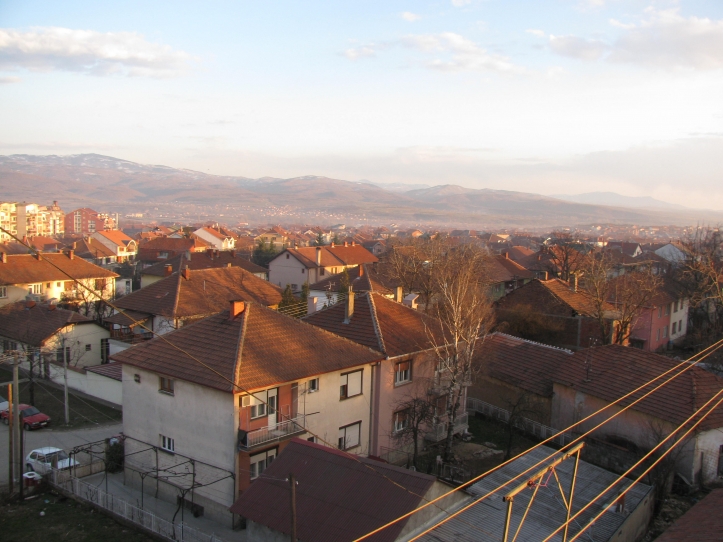
Overview of the lower part of Vranje, with some of the villages in the rest of the valley visible in the distance.
As the dreary day progressed into evening we slogged onward through mud and incessant drizzle, constantly searching for more celebrations. With our instruments slung on our backs, we stumbled for hours down steep and winding roads often barely lit by sporadic street lights while trying to make the entire day’s work pay off. Of the 25 odd homes we tried, though, only four agreed to let us to play for them. Only three of these hosts offered us monetary tips in addition to treating us to a beverage and perhaps some finger foods taken “on the fly.” At the fourth home, the hostess told us with resignation that she had no cash but would give us a 2 liter bottle of juice in return for playing a brief dance melody; she insisted that we perform outside, though, and cut off our performance after a mere minute. Utterly exhausted, drenched, muddied, and frustrated, we gave up, returned to Vranje, and tallied up our earnings. An entire day’s work had barely brought in 550 dinars in total—roughly $8 USD—for the five of us. After taking out the 200 dinars to pay for the gas spent in driving to the villages and back, we were left with merely 70 dinars per person. At slightly over $1 USD, this was just enough to pay for a small pljeskavica burger each at a fast food stand, while we shared the 2 liter bottle of juice that rounded out our earnings.
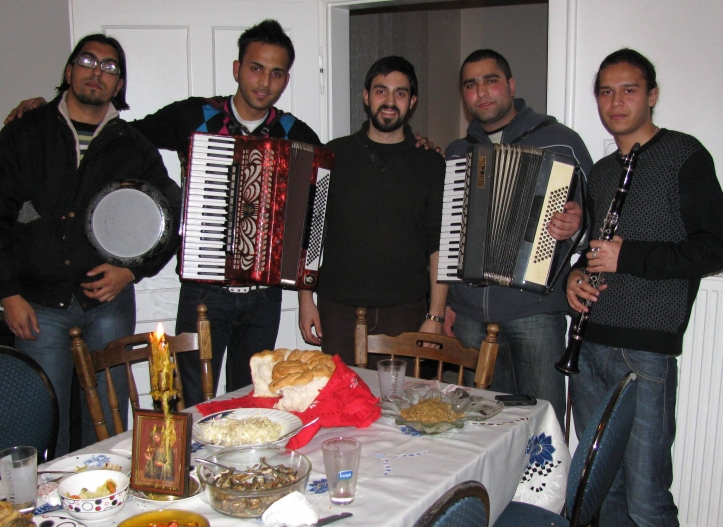
The author with the young Romani musicians he accompanied during the performances described.
Joking darkly about our situation, my Romani companions commented that at least these earnings saved their families the cost of feeding them for the evening. They justified their resignation by reminding me that this situation is increasingly becoming the norm—music is simply not as lucrative as it was a few decades ago, under better conditions, for the older generation of Romani musicians. Although I had repeatedly heard and seen the evidence of the effects of this crisis on musicians, no experience during my research more profoundly drove home the reality of their lot. I glimpsed firsthand the increasingly tense interactions with patrons, difficult conditions, and constant worry and frustration that Romani musicians struggle with in order to earn their “daily bread.” The emotional and corporeal experiences that I shared with these young musicians thus clinched an important turning point in my dissertation research. They helped me to understand more deeply the essential import of Romani music as work—as labor—and therefore drove home the centrality of such concerns in their narratives concerning musical, professional, and ethnic identity.
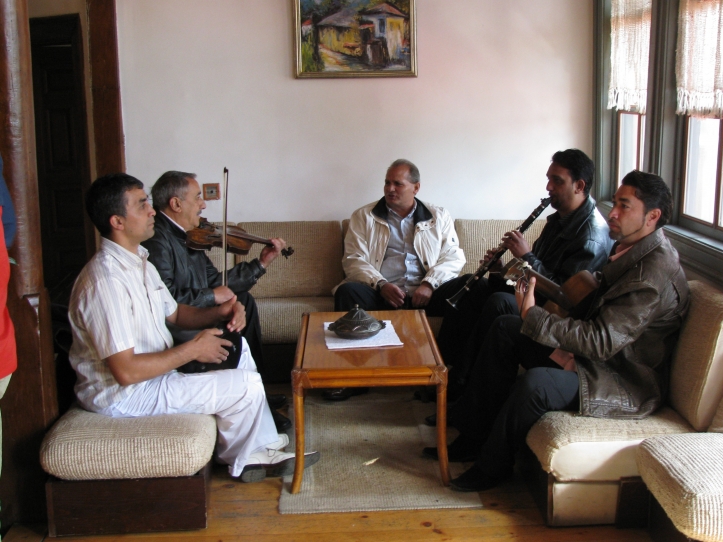
Another group of Romani musicians who work the same niche as the group above, warming up for a gig in Vranje.





